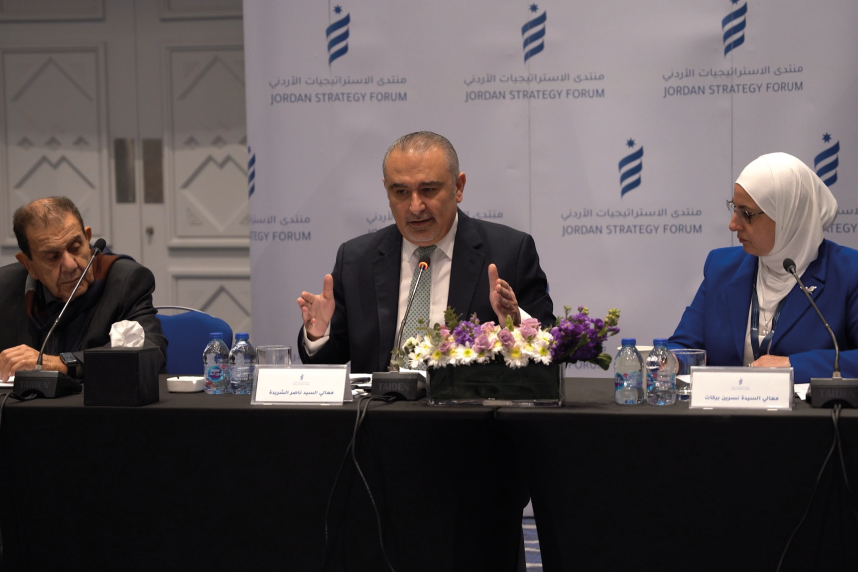The Jordan Strategy Forum holds a discussion session with H.E. Nasser Al-Shraida on the future of "The New City"
06-12-2022
Deputy Prime Minister for Economic Affairs and Minister of State for Public Sector Modernisation Nasser Shraideh on Tuesday said that the ministerial Economic Growth and Prosperity Committee has examined the new city project referred to by the Cabinet in October.
The committee recommended conducting detailed studies for the project, which is expected to provide 90,000 to 100,000 direct and indirect job opportunities during the construction period, which extends to 2033, the Jordan News Agency, Petra, reported him as saying.
Concluding studies, it is expected to start implementing the project in 2025, whose first phase will be completed in 2033 while the rest of its phases will be completed in 2050, he said.
In a meeting held with Jordan Strategy Forum (JSF) and Dar Al Handasah Consultants for Engineering Design, which conducted preliminary feasibility studies for the project, in the presence of private sector representatives, participants affirmed that the city will not become an alternative capital.
The project was introduced in 2017, but was rendered a lower priority due to a number of factors, including the spread of the coronavirus pandemic.
The construction site has been examined economically and demographically to ensure linking it to other vital projects of the Kingdom.
He added that the project comes within the state's economic vision and aims to sustainably accommodate the growing population in Amman and Zarqa as a model for modern cities, providing better quality of life, economic growth, environmentally friendly technologies and fast-frequency intelligent transportation system.
JSF Chairman Abdel Elah Khatib highlighted the importance of the meeting, describing it as the beginning of a national dialogue for a promising project to serve public interest.
JSF CEO Nisreen Barakat said that the meeting comes as part of the forum's efforts to promote constructive dialogue between public and private sectors, consult the concerned experts and discuss proposals related to the new city project.
Barakat also noted that the private sector is an essential partner, with a critical developmental role to stimulate investment and create job opportunities.
Representing Dar Al Handasah, Tharwat Masalha noted that the new city will “unleash opportunities for sustainable growth in Jordan by providing job opportunities, improving the quality of life, and supporting the development of technical, smart and entrepreneurial economic sectors as part of a sustainable and environmentally friendly living model.
The new city project will be built in Amman on land owned by the Treasury, with a total area of 25,000 dunums, 40 kilometres away from the centre of the capital, 27 kilometres from Queen Alia International Airport and 32 kilometres from Zarqa.
The city will be adjacent to two international roads linking Jordan with Saudi Arabia and Iraq, he said.
The modern city will include business centres, main services, governmental institutions, hotels, recreational facilities, research centres, health and education institutions, including a hospital and a university, he said.
In regard to transportation, the rapid bus transit lines will be linked to the current rapid bus network, in addition to the possibility of providing regional transportation to Amman, Zarqa, and Queen Alia International Airport, he added.
Relieving pressure on real estate development in Amman, the project will help control the increase in real estate prices, as the new city will contain housing units in the first phase.
It will also reduce pressure on infrastructure, improving their efficiency, and reducing traffic congestion and environmental pollution.
In addition, the project will also improve work efficiency of administrative sectors and institutions by decreasing pressure on them, Petra reported.
- Related to the news :
- Pictures


